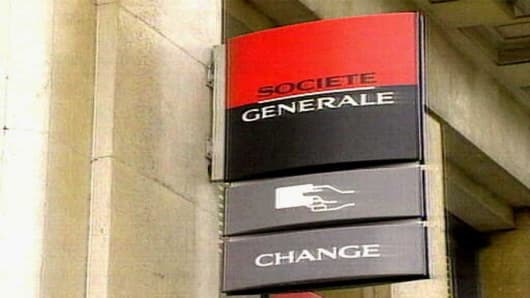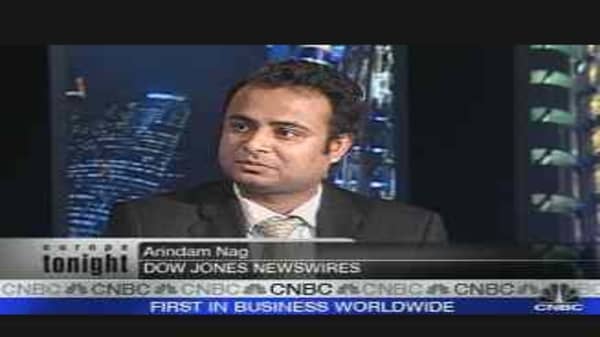“We considered it a mission,” recalled Antoine Paille, who recruited Jean-Pierre Mustier, now the head of Société Générale’s corporate and investment bank. It was Mr. Mustier who ultimately confronted Mr. Kerviel after his fraud was discovered on Jan. 18.
While based in the United States in the 1990s, Mr. Mustier and another derivatives executive, Luc François, organized a sailing competition with other banks and steered the Société Générale boat to victory. Mr. François eventually rose to head the derivatives business but reportedly left last month after the revelation of Mr. Kerviel’s trades.
A Red Flag Cited
Mr. Kerviel was never viewed as soldier-monk material. He was a provincial from decidedly middle-class stock — the son of a hairdresser and a metal- shop teacher — but he possessed an advantage that his better-bred superiors did not.
In his five years toiling in the back office before being promoted to Delta One in 2005, he had become expertly familiar with the proprietary system Société Générale used to book trades, known as Eliot inside the bank. While the risk-control department did monitor the bank’s overall positions very closely, it did not verify the data Mr. Kerviel entered into Eliot. And Mr. Kerviel knew the timing of the nightly reconciliation of the day’s trades by Eliot, so he was able to expertly delete and then re-enter his unauthorized transactions without being caught.
Mr. Kerviel’s method of entering trades was one red flag cited by Eurex in its initial warning, along with questions about two “large” positions — one net short position in DAX futures and one net long position in Euro Stoxx 50 futures. In the same letter, they asked what his investment strategy was and why these transactions were often entered through a London-based Société Générale subsidiary called FIMAT Futures Limited. Eurex even inquired whether Mr. Kerviel had entered the transaction automatically or manually.
“Please explain the background for this procedure,” two Eurex officials wrote to Xavier de la Maisonneuve, a compliance officer at Société Générale who has been questioned by investigators.
Vincent Duclos, another compliance officer in the equity derivatives division, not yet questioned by the police, provided the Nov. 20 and Dec. 10 responses to Eurex. His replies in part were based on accounts provided by Mr. Kerviel and his supervisor, as well as a compliance officer at FIMAT, said Jean Veil, a lawyer for Société Générale. Mr. Kerviel’s “supervisor had signaled that there was no anomaly whatsoever,” Mr. Veil said.
Mr. De la Maisonneuve, who received the initial query on Nov. 7, said the bank gets 15 to 20 queries from different exchanges each year, many of them from Eurex.
In a telephone interview Monday night, he insisted his team had been in telephone contact with Eurex after their two letters in November to ensure it would fully answer their queries.
“Their questions were based purely on strategy and procedure,” he said. “At no moment of these conversations was there any mention of abnormal volumes. They considered our second written response adequate and satisfying.”
He added that Eurex did not take up Société Générale’s offer of a conference call to further discuss the matter after the Dec. 10 letter.
A top official at Société Générale, who insisted on anonymity because of the sensitivity of the matter, said that in the weeks after the Eurex warning, Mr. Kerviel was shaken, and took additional steps to cover his tracks. He tried to manipulate areas of the internal risk-control system he was unfamiliar with, which ultimately led to the discovery of his suspected fraud in mid-January.
In his testimony to the police, however, Mr. Kerviel identified two members of the Delta One team he said were familiar with his activities going back to last April. These colleagues, according to lawyers familiar with the case, were Martial Rouyère, head of the Delta One trading desk, and his deputy, Eric Cordelle. Mr. Rouyère has since been questioned by the French authorities. Mr. Veil said he expected Mr. Kerviel’s “entire hierarchy,” including Mr. Mustier, to eventually be questioned by the police.
Given that Mr. Kerviel was able to exceed trading limits and evade detection for so long, as well as Société Générale’s handling of Eurex’s November warnings, “we can easily infer that the internal controls were either inadequately designed or have not been operating effectively and efficiently,” said Francis Hounnongandji, a corporate governance expert who is also president of the French chapter of the Association of Certified Fraud Examiners.
That conclusion is being echoed at the highest levels of the French government. On Monday, Finance Minister Christine Lagarde said, “Very clearly, certain mechanisms of internal controls of Société Générale did not function, and those that functioned were not always followed by appropriate modifications.”
In meetings with investors in recent days, Société Générale’s chief executive, Daniel Bouton, has admitted his bank’s internal systems did not keep up with the pace of growth in the derivatives business. “He told them while our derivatives business was going 130 miles an hour, risk control was only going 80,” according to one analyst who covers Société Générale but insisted on anonymity.
He added that with traders making so much money, the analyst added, ”they were untouchable; they had the power.”
Pascal Decque, an analyst who covers Société Générale in Paris for Natxis, agreed that the bank was more willing to take risks than any of its French rivals, including BNP Paribas, which is rumored to be considering a bid for Société Générale.
As an example, he cited Société Générale’s loss of 2 billion euros stemming from subprime-related investments — twice the size of the hit BNP Paribas took, even though BNP is larger.
Suspiciously Good Timing
The Securities and Exchange Commission is investigating whether Robert Day, an American Société Générale board member, violated insider trading rules by selling shares worth 45 million euros before the bank’s audit committee was informed of the subprime loss.
Société Générale and a spokesman for Mr. Day said last week that the share sales by Mr. Day and his family’s trusts occurred in several transactions from December 2007 to Jan. 18, during a predetermined window when directors were allowed to exercise options. Both statements said all required disclosures were made, and “no inside information was used in any way” with respect to these sales.
As for Société Générale, the price of its hubris is still to be tallied. Like many observers, Mr. Decque believes it likely that the bank will eventually lose its independence as a result of Mr. Kerviel’s losses, most likely via an acquisition by another French bank.
“Soc Gen was brilliant in their achievement, they were the world leader in derivatives,” Mr. Decque said. “Maybe when you are that good, you think you will never fail.”




